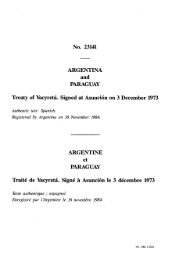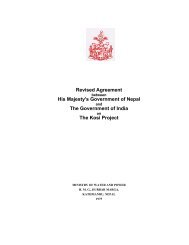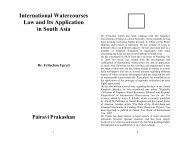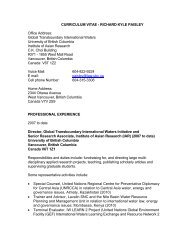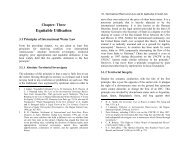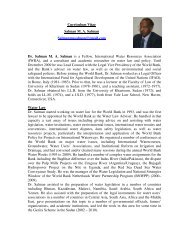Upreti, Trilochan, International Watercourses Law and Its Application ...
Upreti, Trilochan, International Watercourses Law and Its Application ...
Upreti, Trilochan, International Watercourses Law and Its Application ...
Create successful ePaper yourself
Turn your PDF publications into a flip-book with our unique Google optimized e-Paper software.
48 / <strong>International</strong> <strong>Watercourses</strong> <strong>Law</strong> <strong>and</strong> <strong>Its</strong> <strong>Application</strong> in South Asia Development <strong>and</strong> Codification of <strong>International</strong> <strong>Watercourses</strong> <strong>Law</strong> / 492.5.3 Gabcikovo-Nagymaros Case, Hungary v. SlovakiaHungary <strong>and</strong> Czechoslovakia concluded a treaty in 1977concerning the construction <strong>and</strong> operation of a project designedto develop, share <strong>and</strong> allocate benefits from the Danube River.This project was to be carried out by joint investment <strong>and</strong> onthe basis of a mutual management plan. The system wasdesigned to attain the broad utilisation of the natural resourcesof the Bratislava-Budapest section of the Danube River for thedevelopment of water resources, energy, transport, agriculture<strong>and</strong> other sectors of the national economy of the contractingparties. 79 The plan was aimed at the production ofhydroelectricity, the improvement of navigation on the relevantsection of the Danube <strong>and</strong> the protection of areas along thebanks against flooding. While the treaty arrangement was beingconsidered for implementation, the environmental effect of theproject was heavily criticised. The Hungarian Government, as aresult of severe pressure from its civil society, was compelledto postpone the project at first, <strong>and</strong> later (1991) terminated thetreaty unilaterally because negotiations with Czechoslovakiadid not yield any positive result. In the mean time, Slovakia (asuccessor state from Czechoslovakia) decided to begin theconstruction <strong>and</strong> then to put the project into operation by aprovisional solution. Both nations failed to resolve the disputes.Subsequently, as a result of the European Union’s effort, theyagreed to submit the case to the ICJ for adjudication. 80The Court dealt with several issues, i.e., suspension <strong>and</strong>ab<strong>and</strong>onment of the project by Hungary, issues ofenvironmental consideration, state of necessity, theimpossibility of performance of the Treaty, the occurrence of afundamental change of circumstances, the material breach ofthe treaty <strong>and</strong> development of new norms of internationalenvironmental law. Refusing all the above-mentioned79 Preamble of the Treaty Concerning the Gabcikovo-Nagymaros Project1977 at 1109 UNTS, p. 211.80 Para 15-25 of the ICJ's judgement 37 ILM (1998), pp. 162-202.arguments, the Court reached the conclusion that Hungary wasnot entitled to cancel the project. 81 The Court dismissed theabove-mentioned Hungarian submission <strong>and</strong> held the view thatto suspend <strong>and</strong> subsequently ab<strong>and</strong>on the project was notlegally justifiable. Instead of doing so, Hungary would have totake the opportunity to have recourse to the dispute settlementmechanism contained in the treaty. The court further held theview that:"the 1977 treaty was not only a joint investmentproject for the production of energy, but it was alsodesigned to serve other objectives as well: theimprovement of navigability of Danube, flood control<strong>and</strong> regulation of ice-discharge, <strong>and</strong> protection of thenatural environment. None of these objectives hasbeen given absolute priority over the other, in spite ofthe emphasis, which is given in the treaty to theconstruction of a system of locks for the protection ofenergy. None of them has lost its importance. In orderto achieve these objectives the parties acceptedobligations of conduct, obligations of performance<strong>and</strong> obligations of result". 82 “The treaty could not berepudiated unilaterally: Article 26 of the ViennaConvention of 1969 on the <strong>Law</strong> of Treaties, combinestwo elements, which are of equal importance. Itprovides that every treaty in force is binding upon theparties to it <strong>and</strong> must be performed by them in goodfaith. The principle of good faith obliges the parties toapply it in a reasonable way <strong>and</strong> in such a manner thatits purpose can be realized." 83Thus, the judgement obviously indicated that the way ofconfrontation instead of co-operation does not help to share <strong>and</strong>develop a project in a shared resource. Regarding the unilateraluse of the Danube by Slovakia, the Court held the view:81 Ibid. Para 59, p. 187 <strong>and</strong> pp. 191-197.82 Ibid. Para 135, p. 200.83 Ibid. Para 142, p. 201.




